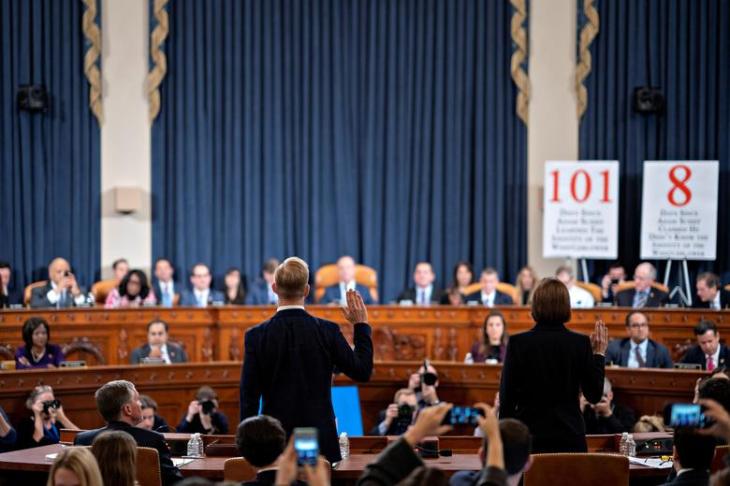If there ever was a time when top-notch media analysis skills were crucial for American citizens, the past two weeks were the motherlode of opportunities to sort out manipulated messaging from simple truth.
Dig into that statement a bit. Is it possible to make students better consumers, curators and adjudicators of the digital/media information firehose? Or have schools dumbed down curriculum and academic demands, leading to a heedless citizenry, amusing itself to death? (I didn’t come up with that phrase, BTW—Neil Postman did, long before Facebook, Twitter and Celebrity Apprentice, when cable news was the most dangerous thing on TV.)
The phrase ‘dumbing down’ (or—worse—’dummying down,’ putting emphasis on students’ reputedly flabby brains) has always been anathema to me. I have never—in 40 years of working in classrooms—observed a serious curricular trend toward making things less complex or challenging. In fact, since I started teaching, in the early 1970s, there has been a steady upward push toward what reformy types might call rigor.
States have adopted ‘merit’ curricula, demanding four years of HS math and other course sequences that used to be reserved for the college bound. All public-school students in the nation submit to high-stakes standardized tests annually, beginning when they’re barely eight years old. Seventh graders solve single-variable equations that used be the stuff of ninth grade Algebra. The phrase ‘kindergarten is the new first grade’ is now conventional wisdom in early childhood pedagogy.
Not seeing the dummy-down phenomenon here, except in op-eds by irate business leaders who claim they can’t find the skilled workers they need.
And, of course, some of our Congressional representatives who seemed unable to form rational questions or evaluate and respond to answers when grilling the brave civil servants who sat in front of them last week. Watching and listening, it was easy, over time, to see the obvious chasm between ‘just the facts’ (under oath) and ‘spin, baby, spin’ (not under oath). I kept asking myself: Who is impressed by the shouting, off-topic rants and left-field accusations?
Heather Cox Richardson answered: Using my eye for propaganda techniques, they reminded me of nothing so much as being a talking head on a documentary. When producers are filming you in that situation, they very carefully ask questions to get a sound bite they can use. It seemed very clear to me that Jordan and Ratcliffe, and especially Nunes, were tangling the witnesses in questions designed to give the questioners short sound bites that they could then make into their own “documentaries.” They were salting the hearings with the language of conspiracies that people who don’t watch Fox cannot understand but which, in their sound bites, can be turned into a narrative that will misrepresent what was said and proven today, marketing it to True Believers who will then continue to support Trump and his party.
And then, as soon as they got their sound bites they would get up and leave.
What I was wondering: Can this ‘eye for propaganda’ be taught? Is it important that our students learn more than facts, timelines and skills? Can they be taught to assess value and truth in all their studies (and I don’t mean just their History, Civics and Government courses)?
Or will they be ripe targets for ‘contagious stories’—simple, emotionally self-validating explanations for current events and issues? Can flagrant lying be ignored or tolerated to maintain the peace, preserve the Republic? We are approaching ‘Germany in the 1930s’ territory here.
Stephen Sawchuk had a provocative piece with a great headline in Education Week: Students Are Really, Really Bad at Spotting Fake News, Misleading Websites. I don’t think it’s only students who are really, really bad—I think it’s the general population, distracted and trying to keep their heads above water, who are finding it hard to get at the truth. It’s all about where you get your news. There is, Sawchuk says:
…alarming evidence that a large majority of students are not well prepared to investigate sources of information for their accuracy, relevance, and quality. And despite more than a decade’s worth of policy chatter about media literacy, whatever schools have been doing doesn’t appear to have been enough to inoculate students against “fake” news.
It’s doubly concerning given that there are now entire cable-news networks and partisan news sites built around presenting a skewed accounting of facts. Social media hasn’t helped: The atomized nature of online interactions makes it easy to share doctored or fake information. And increasingly, as another recent report coined it, “truth decay” is eroding the notion of objective facts: Americans can’t even agree on a set of basic facts that underpin their arguments or conclusions anymore.
Sawchuk gets this exactly right. I can’t think of a single thing more important, or relevant, in a liberal arts curriculum, K-12, than an investigation of the veracity of news sources. Or teaching kids how, Step One, to be deeply suspicious of pretty much anything that crosses their tiny screens.
It’s not just about sorting out the truthful, centrist sources, and identifying bias in sources. It’s about demonstrating how vulnerable we all are to stories that ring our emotional chimes. Especially kids.
Let me say that again: especially our students. We should be talking about this in schools.
Or else we’re going to end up with more captions like this— In rollicking 53-minute conversation, Trump embraces conspiracies, spreads falsehoods and insults opponents—that make it sound like conspiracies, falsehoods and insults were somehow ‘rollicking’ (‘exuberantly lively; amusing’). I know better than to assign blame to the writer—headlines are added later and play by different rules.
But really. Isn’t it time we stopped laughing?
Can schools nurture civic engagement? I think so.
No time like the present.


I’m going to share something, but it’s simply sharing with readers. As this is an open forum, public, people get to share and discuss, something that is being lost in our schools and other venues. Discussions, real discussions, considering each other’s ideas is becoming, or has become, a lost skill.
When I was young, I had difficulty understanding what adults were talking about. I remember, with a couple of friends, we were arguing about something (which I don’t remember today), but I do remember it was a kind of politics. I started arguing. They made points. I made points. But then, I didn’t understand the conversation any longer, so I stopped and we went back to what young friends do. But this made me wonder. I also saw that ego or pride had something to do with their positions. Like proving something and being in the right was more important. This, I think, caused me to lose interest. Why should I prove a point just to be right? Or to seem intelligent? Later, I considered, why use high-brow words, ten dollar words, just to impress others? Who am I impressing? And to what end? Most people don’t want to think like this.
Over the years, through work and hobbies, listening carefully, I understood what this thing called understanding is. You see, in college, I knew (during my second stint) that I could no longer study the way I had in the past, when I got all A’s. So, I searched for ways to learn while in class. I found, by listening to the professor, carefully, drawing pictures of what they were explaining, or summarizing in my own words, I could capture their message(s). Once I understood where they were coming from, everything else fell into place. A’s came easy (almost no after school study time). I could understand whether they had something, or whether it was gobbledygook. But if gobbledygook, then I understood why, which also was an education unto itself.
I also “ticked” off some professors when they realized I understood them. I wondered, why should I tick them off. There are some people that want to “amaze” and awe others. I was never awed. I just looked to understand. You see, to be understood is to be placed at the same level as everyone else. Someone asked if I’m a teacher. I explain: that’s what they call me.
At a friend’s store, we sometimes sit and chat. A couple high school students (The owner knows their mother.) sometimes come by to study. One time, she asked me about a science lesson. The store owner thought this was an opportunity to show off my skills, why I could teach kids anything. I said, it’s not a magic trick. Anyone could do what I do if they understood. So, I looked at what the young lady was learning, then reviewed it. I said, oh, it’s easy. She asked me to tell her. I said, not good for you. All you have to do is read it, break it down, and explain each. At first, she balked. When she realized I would give no answers, just a hint (which she understood), she started working. Ten minutes, and she had it all figured out. Tada. I did nothing. I just showed her where the understanding was in her mind.
No fanfare. No wallah. But that’s the key. Understanding. When kids/teens get this, they realize they have to put in the work, but the understanding comes faster. Because they “see.” The rest of their education will depend upon the time they put in. You get out directly what you put in. No more, no less. But you learn to think for yourself. Never let other’s, what seems amazing, knowledge intimidate you.
But I also learned something else. I finally understood rhetoric and intellectual speak. I can do that too. But it’s so tiresome. I can’t sound very intelligent, perform whirls around my students, but I choose to speak plainly, using words that directly explain meaning. Like I told one student who struggled with math, you’re using your language brain. You have to use your math brain (That’s how I see it.). What? She asked. Well, when I’m teaching, listen carefully, take notes. Then, when you’re looking at the problem, look at one as from a distance, as if you’re attempting to see the parts. This one little explanation helped many children.
Language can be used to inform, amaze (dazzle), and/or encourage understanding. I’m always suspicious of dazzle. Understanding are little “ah haa” moments. I don’t educate. I get the students to “see” things for themselves. Around me, you won’t feel “pride” in what you know. But you might appreciate what you come to realize. It’s like coming from within. You see, but you can’t explain how you understand. It’s like “real” information. When the students experience “understanding,” they come alive. Information is not being driven into their heads. They’re not memorizing. As I explained to my students, once you understand, the understanding is yours. It’s part of you. And you never can forget. Oh, you might forget the information after time, but when it’s brought up again, you see it and it comes back.
Regarding politics. All you need to do is understand people. First, you understand yourself, then you understand others. There’s a road of time, reading, and experiences, but people are not that complicated. Oh, they may see intelligent, but information is information. Understanding is alive. And each of us have our strengths and weaknesses, and our own road to follow. But that’s for each person. I ask a student, having problems with another, after they’ve calmed down, what do you think the reason is for the other’s behavior? What is the reason for your own? You see, in this way, they reflect. Then, they can come together and solve their own problems. With time, they can also understand the politicians, which is very, very easy.
LikeLiked by 1 person